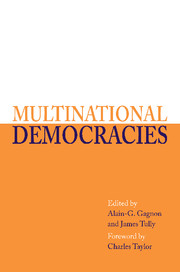Book contents
- Frontmatter
- Contents
- Notes on the contributors
- Foreword by Charles Taylor
- Acknowledgements
- Introduction
- Part I Justice and stability in multinational democracies
- Part II Struggles over recognition and institutions of accommodation
- 5 Federalism, federation and collective identities in Canada and Belgium: different routes, similar fragmentation
- 6 Recognition claims, partisan politics and institutional constraints: Belgium, Spain and Canada in a comparative perspective
- 7 Ethnoterritorial concurrence in multinational societies: the Spanish comunidades autónomas
- 8 Mutual recognition and the accommodation of national diversity: constitutional justice in Northern Ireland
- 9 Federalist language policies: the cases of Canada and Spain
- 10 Competing national visions: Canada–Quebec relations in a comparative perspective
- Part III Modes of reconciliation and conflict management
- References
- Index
9 - Federalist language policies: the cases of Canada and Spain
Published online by Cambridge University Press: 06 October 2009
- Frontmatter
- Contents
- Notes on the contributors
- Foreword by Charles Taylor
- Acknowledgements
- Introduction
- Part I Justice and stability in multinational democracies
- Part II Struggles over recognition and institutions of accommodation
- 5 Federalism, federation and collective identities in Canada and Belgium: different routes, similar fragmentation
- 6 Recognition claims, partisan politics and institutional constraints: Belgium, Spain and Canada in a comparative perspective
- 7 Ethnoterritorial concurrence in multinational societies: the Spanish comunidades autónomas
- 8 Mutual recognition and the accommodation of national diversity: constitutional justice in Northern Ireland
- 9 Federalist language policies: the cases of Canada and Spain
- 10 Competing national visions: Canada–Quebec relations in a comparative perspective
- Part III Modes of reconciliation and conflict management
- References
- Index
Summary
Introduction
Language policies serve to regulate the effects of the contact between a majority language and one or more minority languages. Where language constitutes the main marker of communal identity, language policies moderate or, alternatively, intensify intercommunal conflict (McRae 1983, p. 32). While one of their objectives is to ensure peace and order, language laws also have normative grounds. They can be conceptualized as duties fulfilled towards a particular community making moral or historical claims that have currency in a given political context. Understood this way, they are the product of competing claims, individual or collective, to language protection. It is no surprise, then, that a language policy acquires symbolic properties (Rocher and Marcotte 1997, p. 266), for it is a reflection of a state's response to claims of justice and to power struggles among linguistic communities.
In federal states, more than one level of government is usually involved in language matters. This gives rise to a complex language rights regime that combines the policies of two governments whose objectives do not always converge. Federalism implies a delicate balance between unity and diversity, as does a language rights regime that includes a central government policy of one or more official languages statewide alongside a regional government policy that promotes a particular language in its own jurisdiction. A federalist language rights regime in a multination state is invested with a symbolism of its own, namely as a recognition of the linguistic identities of the state's constituent nations and of the value of raising some of these languages to official status at the central state level.
- Type
- Chapter
- Information
- Multinational Democracies , pp. 242 - 256Publisher: Cambridge University PressPrint publication year: 2001
- 3
- Cited by



